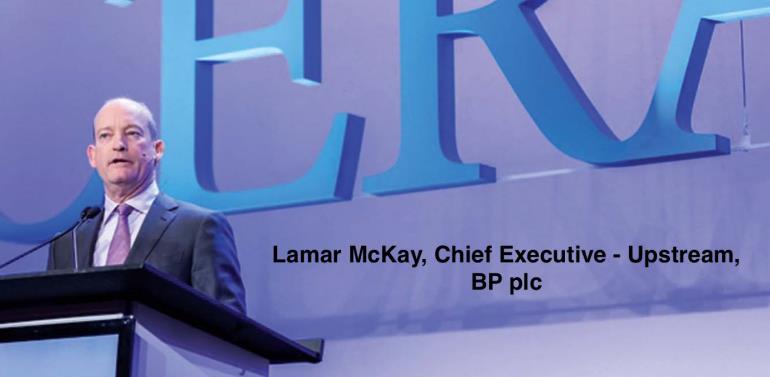Experts
Competitiveness, Growth and Technology – Lamar McKay, BP

Our own positioning in BP has been to create a balanced portfolio with a range of competitive options. We have options geographically:
• onshore and offshore
• oil and gas
• conventional and unconventional
• and across different contractual arrangements.
We’re around 50 – 50 oil and gas at the moment but with an increasing bias towards gas as a lower carbon fuel, and with substantial growth potential. We’re moving towards 60 per cent gas over the next decade as a number of mega-projects come on stream, such as:
• those in the West Nile Delta in Egypt,
• at Khazzan in Oman
• and in Azerbaijan with the Shah Deniz 2 project that will feed into the Southern Gas Corridor to Europe.
Each of those mega-projects will come on line between now and 2020 and they will be providing a backbone of growth in the near to medium term, and generating value for many decades to come.
NEW TECHNOLOGY AND NEW WAYS OF WORKING
As well as growth, those projects also illustrate my third point – which was about new technology and new ways of working. If you take Khazzan as an example, that involves the transfer of tight gas technology from the US to Oman – from the mid-West to the Middle East if you like.
And, by the way, recently we announced an expansion of that project that will take plateau production from 1 billion cubic feet of gas per day to 1.5 or roughly the same level of capital expenditure we initially expected. Another example of where we are driving value into our project portfolio.
I believe the unconventional revolution will spread internationally, albeit slower than in the US. We’re also now looking at some really exciting opportunities for using the technology in many other places around the world. And finally in Egypt we have seen a great example of combining new technology and new depths of co-operation.
We have been working with Maersk, who have some of the world’s most advanced drilling simulators in Denmark and also here in Houston, and we got together to recreate the conditions the drilling teams would come up against offshore in the Nile Delta. And it’s not just digitally recreating conditions through the screens and the instruments, but physically as well – this simulator moves like it’s on the ocean.
We got the rig crews from BP and the contractors together, executing and practicing plans as an integrated unit. What they learned in the simulator led to improved procedures and got everyone working together as one team. And the real wells were not only drilled safely. They were highly efficient. In fact the team safely competed six of the most rapidly drilled wells ever in the Nile Delta.
CONCLUSION
What I see is a level of commitment and performance that says we can come through this period as an industry and continue to be safe and competitive. We are showing again that we are an industry with a truly remarkable capacity to change and adapt.
In the early part of the last century, we figured out how to produce oil from deep below the desert. A few decades on we developed technology to produce oil from deepwater. More recently we’ve made advances to technologies to produce from oil sands and tight rocks. And now all of us are finding ways to deploy our technologies and capabilities with maximum efficiency.
So times are tough right now – but we will come up with the answers. We’ve done it before many times over… and we will do so again.
-

 Banking & Finance2 months ago
Banking & Finance2 months agoOman Oil Marketing Company Concludes Its Annual Health, Safety, Environment, and Quality Week, Reaffirming People and Safety as a Top Priority
-

 News2 months ago
News2 months agoJamal Ahmed Al Harthy Honoured as ‘Pioneer in Youth Empowerment through Education and Sport’ at CSR Summit & Awards 2025
-

 OER Magazines2 months ago
OER Magazines2 months agoOER, December 2025
-

 News2 months ago
News2 months agoAI Security Conference 2025 Hosted by Securado Highlights the Changing Cybersecurity Landscape
-

 Insurance1 month ago
Insurance1 month agoSupporting Community Wellness: Liva Insurance Sponsors Muscat Marathon 2026 with Free Health Checkups
-

 Interviews1 month ago
Interviews1 month agoEXCLUSIVE INTERVIEW: TLS Rebranding Marks Strategic Leap Toward Innovation, Sustainability & Growth
-

 Insurance4 weeks ago
Insurance4 weeks agoLiva Insurance Supports Community Wellness Through “Experience Oman – Muscat Marathon 2026”
-

 Banking & Finance4 weeks ago
Banking & Finance4 weeks agoA New Platform for SME Growth: Oman Arab Bank Unveils Tumouhi































You must be logged in to post a comment Login